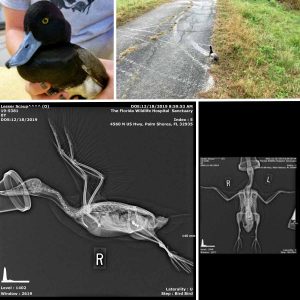 The following story was shared with us by the Florida Wildlife Hospital.
The following story was shared with us by the Florida Wildlife Hospital.
On December 16, 2019, we received a lesser scaup from Merritt Island. The rescuer had found the bird near a boat ramp at a public park and suspected it had a hurt wing.
After allowing it time in a dark, quiet room to de-stress, we completed a hands-on examination. It was thin, pale, and exhibiting neurological issues. We were unable to palpate any injuries during the exam, but it exhibited an abnormal gait. Given its mentation, we decided to take a quick radiograph with the patient awake. The X-ray showed several small masses in the GI tract. Given the radiograph results and the clinical signs we suspected potential lead toxicity.
We took a blood sample and sent it over to a neighboring rehabilitation center that has an in-house lead analyzer. While we waited for the blood results we provided supportive care. We gave it subcutaneous fluids at admission and gave it some time to relax. After several hours we slow-tracked it onto EmerAid Intensive Care Omnivore.
The following morning we received the lead test results back, which were negative. We continued to administer SQ fluids twice a day and added Liqui-Tinic to the treatment plan to help correct the anemia. Its mentation appeared to be slightly improved.
On December 18, after the patient had stabilized, we completed full radiographs and had our consulting veterinarians evaluate them. No remarkable findings were reported.
On December 23 the scaup was taken outside to a flight aviary to evaluate it for release. All of its symptoms had subsided and it had gained weight, increasing from 464 grams (about 16.3 pounds) at intake to 493 grams (about 17.4 ounces). The patient was BAR (bright, alert, and responsive) and flying well only a few hours later. On December 24, we were happy to return the patient back to the wild.

